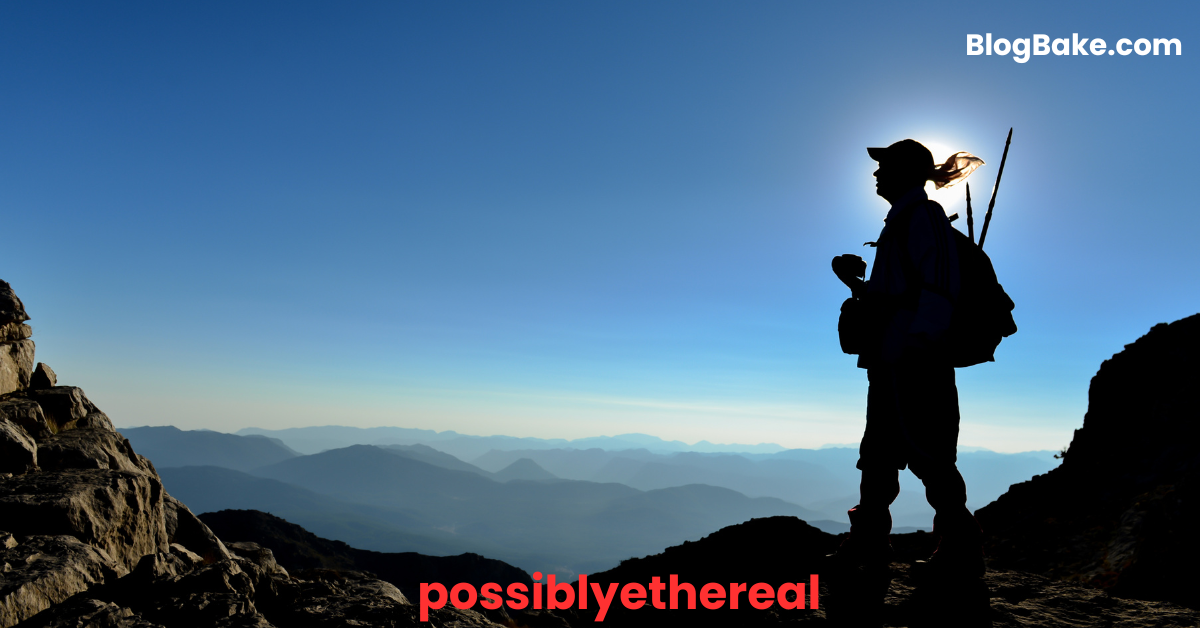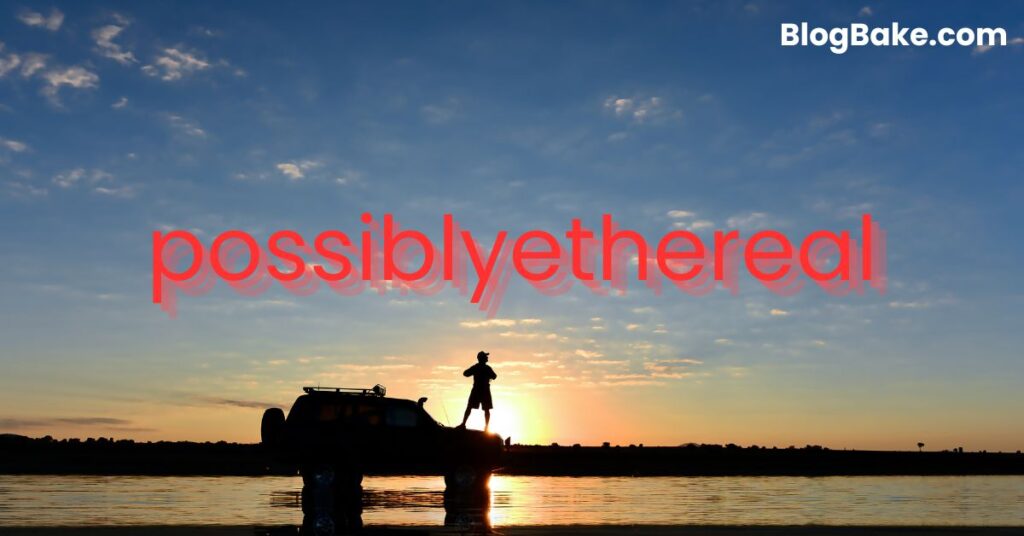Is there anything you’ve ever felt so profound it seemed supernatural, or a presence you couldn’t quite put your finger on? In the words of some, everything is “possiblyethereal.” This essay will delve into the esoteric idea of possiblyethereal, discussing its origins, importance, and manifestations in our life. This voyage is sure to provide insightful and contemplative experiences for everyone, whether they are believers or skeptics.
What is Possiblyethereal?
An ethereal quality is one that is light, airy, and delicate; the word “possiblyethereal” combines this sense with the prospect of seeing such phenomena. In doing so, it alludes to experiences and situations that feel otherworldly, to a more profound and frequently invisible truth.
- Origins of the Term
Although “possiblyethereal” is a product of the modern era, the term has long been used. The Greek word “aither,” meaning “pure air” or “clear sky,” is where the English word “ethereal” gets its start. It developed over time to encompass the extraordinary as well as the commonplace. These encounters are not promised, but rather exciting possibilities, as the word “possibly” implies. - Modern Interpretations
From meaningful moments in nature or art to mystical and spiritual encounters, nowadays, possiblyethereal embraces it all. We are encouraged to look for the remarkable in the commonplace by this term.
Historical Context
Perhaps the best way to make sense of possiblyethereal is to review the various ways in which people have attempted to make sense of paranormal events in the past.
- Ancient Beliefs and Possiblyethereal
The heavenly was frequently linked to the ethereal in ancient civilizations. As an example, the gods of Greek mythology lived in the aether, a celestial plane above Earth. - Middle Ages and Mysticism
It was common practice to associate religious mysticism with supposedly otherworldly experiences in the Middle Ages. Many religious leaders, including saints and monks, claimed to have had experiences that went beyond this life. - Renaissance to Modern Era
Together, science and faith sparked a new fascination with the supernatural during the Renaissance. Even in current times, abstract art and existential philosophy carry on the long-standing practice of attempting to put words to the indescribable.

Possiblyethereal in Literature and Art
The expression and exploration of the conceivably ethereal has a long history in the arts and literature.
- Literary Works from the Classics
Shakespeare and Dante, among others, frequently explore ethereal themes in their works, conjuring up images of the otherworldly through their poetic language. - Art Movements and Possiblyethereal Themes
Surrealism and Romanticism are two art schools that are rife with what seems like ethereal imagery. Salvador Dalí and Caspar David Friedrich are artists whose works provoke feelings of the sublime and mysterious. - Contemporary Works
Artists and writers of the modern age, such as Haruki Murakami and Guillermo del Toro, deal with themes of the otherworldly and the fantastical in their work.
Scientific Perspectives
A number of scientific disciplines provide fascinating insights into what may be ethereal experiences, despite the common belief that such phenomena defy scientific explanation.
- Quantum Physics and the Ethereal
Quantum Mechanics and the Otherworldly According to quantum physicists, the cosmos is far stranger than humans can imagine, and some of the phenomena that occur within it are so obscure and complicated that they border on the otherworldly. - The Fields of Neuroscience and Perception
The field of neuroscience investigates the neural bases of perception, including the possibility of extrasensory perception. Our perception can change in significant ways, according to studies on altered states of consciousness. - Parapsychology and Ethereal Experiences
Many people think telepathy and near-death experiences could be ethereal, thus parapsychologists study them. Despite the controversy, these research expand our knowledge.
Possiblyethereal in Popular Culture
Possibly otherworldly topics fascinate and motivate artists in a wide variety of mediums.
- Movies and TV Shows
Blending the real and the magical, films like “Pan’s Labyrinth” and TV shows like “Stranger Things” go into possible ethereal regions. - Music and Possiblyethereal Themes
Genres such as psychedelic and ambient music seek to produce transcendental audio experiences, and musicians frequently draw on topics that could be otherworldly. - Video Games
“Journey” and “Shadow of the Colossus” are great examples of games that transport players to otherworldly realms and provide them with interactive experiences that make them feel amazed and amazed.
Spiritual and Religious Views
Spiritually significant, transcending religious lines, possibly otherworldly experiences are common.
- Possiblyethereal in Major Religions
The sacred writings of the world’s major faiths—Christianity, Buddhism, and Hinduism—offer explanations for the mystical through their descriptions of otherworldly places and experiences. - New Age Spirituality
Meditation and energy healing are two examples of the new age spiritual practices that promote contact with the supernatural and otherworldly realms. - Personal Spiritual Experiences
From meetings with angels to meditative states of deep calm, many people have reported having personal, perhaps ethereal experiences.
Possiblyethereal in Daily Life
Being open to the perhaps ethereal is not limited to mystics; it can be a natural component of our daily lives.
- Meditation and Mindfulness
Mindfulness and meditation can help you connect with the present moment on a deeper level and perhaps have ethereal experiences. - Nature and the Ethereal Experience
Because of the awe-inspiring grandeur and serenity that nature provides, spending time in it can frequently bring on sentiments that are otherworldly. - Enhancing Everyday Life
Finding wonder in the ordinary and strengthening your bond with the environment around you are two ways that developing an awareness of the perhaps otherworldly might improve your day-to-day existence.
Psychological Impacts
The psychological impacts of potentially ethereal experiences can be substantial, and they can be both beneficial and detrimental.
- Mental Health Benefits
By giving one a feeling of direction and belonging, interacting with potentially ethereal ideas might improve health, lessen the effects of stress, and strengthen resilience. - Risks and Misinterpretations
A balanced and grounded attitude is necessary since misunderstanding potentially ethereal experiences might cause confusion or escapism.
Criticism and Skepticism
The discussion must include critique as not everyone is persuaded by potentially ethereal ideas.
- Common Criticisms
Some people doubt the veracity of supposedly ethereal experiences on the grounds that they are subjective and unsupported by science. - Scientific Skepticism
A scientific skeptic is someone who refuses to believe in assertions that don’t have solid proof and who stresses the importance of thorough research.
Conclusion
While most people focus on the real and quantifiable, possiblyethereal encourages us to embrace the ethereal and venture into the unknown. Whether it’s via art, science, religion, or ordinary experiences, the possiblyethereal provides a window into a captivating yet enigmatic reality. We enhance our lives and establish a stronger connection with awe by allowing ourselves to be enriched by these encounters.
You Are Stronger Than You Think
FAQs
What does Possiblyethereal mean?
Possiblyethereal refers to experiences or phenomena that feel otherworldly or beyond the ordinary, suggesting a deeper, often unseen reality.
How can I experience Possiblyethereal?
Engaging in practices like meditation, spending time in nature, and exploring art and literature can open you to possiblyethereal experiences.
Is Possiblyethereal scientifically proven?
While some aspects are explored by fields like quantum physics and neuroscience, possiblyethereal experiences are largely subjective and not universally accepted by the scientific community.
Are there any risks associated with Possiblyethereal?
Misinterpreting possiblyethereal experiences can lead to confusion or escapism. It’s important to approach these experiences with a balanced and grounded perspective.
How can Possiblyethereal improve my life?
Embracing possiblyethereal experiences can enhance well-being, reduce stress, and foster a deeper connection to the world and those around you.







